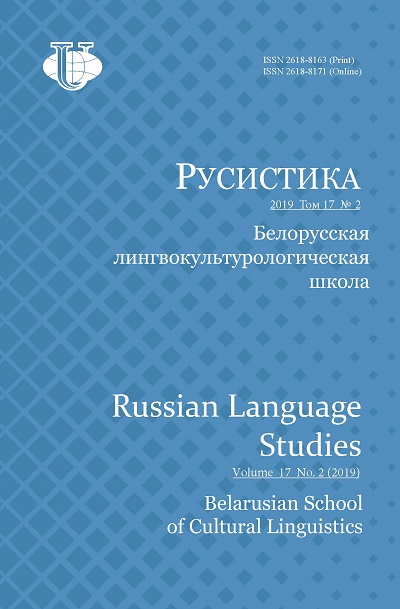О рекуррентности афористических единиц в современном русском языке
- Авторы: Иванов Е.Е.1
-
Учреждения:
- Могилевский государственный университет имени А.А. Кулешова
- Выпуск: Том 17, № 2 (2019): Белорусская лингвокультурологическая школа
- Страницы: 157-170
- Раздел: Лингвокультурология: теоретические и прикладные аспекты
- URL: https://journals.rudn.ru/russian-language-studies/article/view/21112
- DOI: https://doi.org/10.22363/2618-8163-2019-17-2-157-170
- ID: 21112
Цитировать
Полный текст
Аннотация
В современной лингвистике все больше внимания уделяется изучению рекуррентности как свойства и как категории применительно к различным единицам языка и речи. В этой связи особенно актуальным является анализ рекуррентности в ее противопоставлении воспроизводимости на материале сверхсловных единиц. В статье представлена попытка дифференцировать рекуррентность и воспроизводимость на уровне фразы. Цель работы - установить и описать лингвистически значимые параметры рекуррентности афористических единиц. Материалом для исследования послужили около 1000 рекуррентных афористических единиц современного русского языка, зафиксированных в фразеологических и паремиологических словарях, а также выявленных автором в результате наблюдений за речью современных носителей русского языка (записи 2001-2018 гг.). В результате исследования определено понятие рекуррентности как регулярной повторяемости процедуры свободного порождения фразы в стереотипных контекстах, а не как повторяемости фразы в готовом виде в речи. Установлено, что рекуррентные афористические фразы не характеризуются устойчивостью, не обладают переносным значением (как общим, так и отдельных компонентов), не могут иметь номинативную семантику. Рекуррентные фразы не относятся к «стандартам» и «стереотипам» речи, которые функционируют в речи как «готовые формулы», что манифестирует устойчивый характер связи их компонентов. Рекуррентные фразы представляют собой особую разновидность свободных фраз. Среди всех свободных фраз рекуррентные фразы наиболее близки по структуре и способам функционирования к устойчивым фразам. Утверждается, что категориальное отличие рекуррентных и устойчивых сверхсловных единиц является критерием для определения объема фразеологии как части языка.
Ключевые слова
Об авторах
Евгений Евгеньевич Иванов
Могилевский государственный университет имени А.А. Кулешова
Автор, ответственный за переписку.
Email: ivanov-msu@mail.ru
кандидат филологических наук, доцент, заведующий кафедрой теоретической и прикладной лингвистики Могилевского государственного университета имени А.А. Кулешова (Могилев, Республика Беларусь). Сфера научных интересов: теоретическая лингвистика, сопоставительное языкознание, прикладное языкознание (лексикография, лингводидактика), современный русский язык, славянские языки (фразеология, паремиология, афористика). Автор около 360 научных публикаций, из них свыше 40 монографий, учебников и учебных пособий, словарей
Республика Беларусь, 212022, Могилев, ул. Космонавтов, 1Список литературы
- Ахманова О.С. Словарь лингвистических терминов. М.: Советская энциклопедия, 1966. 607 с.
- Верещагин Е.М., Костомаров В.Г. Язык и культура. Лингвострановедение в преподавании русского языка как иностранного. 4-е изд. М.: Русский язык, 1990. 246 с.
- Винокур Т.Г. Штамп (речевой) // Лингвистический энциклопедический словарь. М.: Советская энциклопедия, 1990. С. 588-589.
- Иванов Е.Е. О рекуррентных прототипах крылатых фраз // Славянская фразеология в ареальном, историческом и этнокультурном аспектах: материалы ІІІ Международной научной конференции / под ред. В.И. Коваля. Гомель: ГГУ, 2003. С. 74-78.
- Иванов Е.Е. Лингвистика афоризма: учебное пособие. Могилев: МГУ имени А.А. Кулешова, 2016. 156 с.
- Каньшина Н.А. Проблемные аспекты рекуррентности в лингвистике (на материале французского художественного текста) // Весці БДПУ. Серыя 1. 2015. № 4. С. 64-67.
- Королькова А.В. Русская афористика. М.: Флинта; Наука, 2005. 344 с.
- Леонова Л.А., Шубин Э.П. «Готовые» предложения в современном английском бытовом диалоге // Иностранные языки в школе. 1970. № 5. С. 12-16.
- Маслова В.А. Основные тенденции и принципы современной лингвистики // Русистика. 2018а. Т. 16. № 2. С. 172-191.
- Маслова В.А. Полидисциплинарность и интегративность как главные «приметы» лингвистики будущего // Филологические науки. 2018б. № 5. С. 3-9.
- Маслова В.А. Современная лингвистика - наука о человеке, его сознании, языке и культуре // Гуманитарный вектор. 2018в. Т. 13. С. 6-12.
- Мельчук И.А. О терминах «устойчивость» и «идиоматичность» // Вопросы языкознания. 1960. № 4. С. 73-80.
- Пермяков Г.Л. Основы структурной паремиологии. М.: Наука, 1988. 236 с.
- Райхштейн А.Д. Об устойчивых фразах и «готовых» предложениях // Иностранные языки в высшей школе. 1972. Вып. 7. С. 79-87.
- Смирницкий А.И. Объективность существования языка. М.: Изд-во МГУ, 1954. 33 с.
- Смирницкий А.И. Лексикология английского языка. М.: Издательство литературы на иностранных языках, 1956. 260 с.
- Супрун А.Е. и др. Общее языкознание. 2-е изд. Минск: Вышэйшая школа, 1995. 333 с.
- Титкова О.И. О перспективах развития рекуррентных единиц лексикона // Филологические науки. 2003. № 2. С. 79-86.
- Титкова О.И. К определению рекуррентности // Вестник МГЛУ. Образование и педагогические науки. 2014. Вып. 694. С. 9-18.
- Bußmann H. Lexikon der Sprachwissenschaft. Stuttgart: Verlag Alfred Kröner, 1990. 904 s.
- Іваноў Я.Я. Афарыстычныя адзінкі ў беларускай мове: манаграфія. Магілёў: МДУ імя А.А. Куляшова, 2017. 208 с.
- Charaudeau P., Maingueneau D. Dictionnaire d’analyse du discours. Paris: Seuil, 2002. 667 p.
- Werner A. Terminologie zur neueren Linguistik. Tübingen: Verlag Niemeyer, 1988. Bd. 2. 1059 s.
Дополнительные файлы














